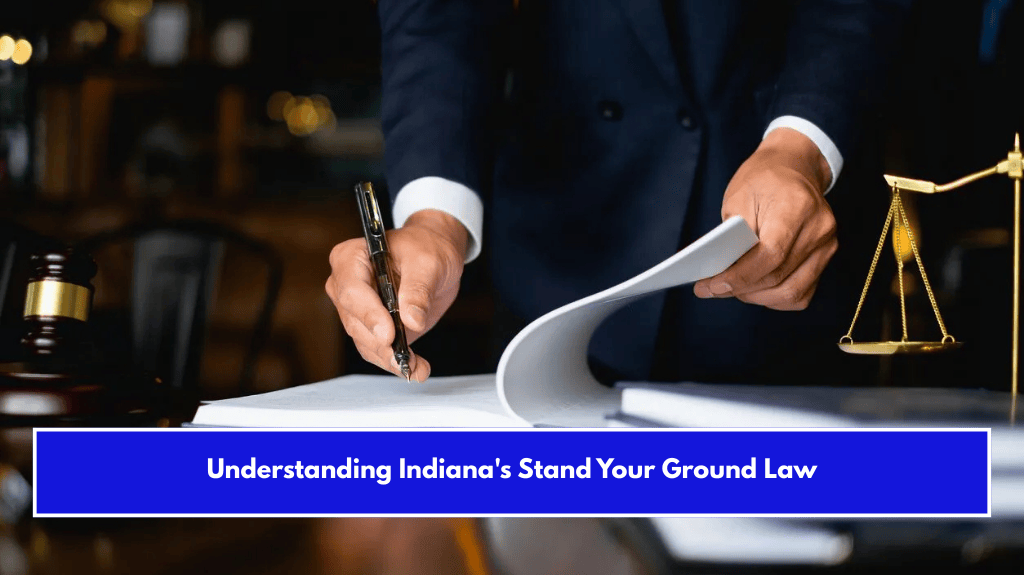Indiana’s Stand Your Ground law is a significant legal principle that allows individuals to use force, including deadly force, in self-defense without the obligation to retreat, provided certain conditions are met. This law is codified under Indiana Code 35-41-3-2 and builds upon the Castle Doctrine, extending protections beyond one’s home to other locations where a person is lawfully present.
Key Features of the Law
- No Duty to Retreat: Unlike jurisdictions that impose a “duty to retreat,” Indiana’s Stand Your Ground law permits individuals to stand their ground and use force if they reasonably believe it is necessary to prevent death, serious bodily injury, or the commission of a forcible felony. This applies both inside and outside one’s home or workplace.
- Reasonable Belief: The use of force must be based on a reasonable belief that it is necessary to protect oneself or others from imminent harm. The threat must be immediate and unlawful.
- Expanded Protections: Indiana’s law extends beyond the traditional Castle Doctrine by covering homes, occupied vehicles, workplaces, and public spaces where individuals are lawfully present.
- Civil Immunity: Individuals who act in justified self-defense are shielded from civil lawsuits under Indiana Code 34-30-31. This prevents attackers or their families from suing for damages caused during an unlawful intrusion.
When Can Force Be Used?
Under the law, force—including deadly force—is justified in several scenarios:
- Preventing serious bodily injury to oneself or others.
- Stopping the commission of a forcible felony, such as burglary or robbery.
- Defending against unlawful entry into one’s home, vehicle, or other occupied property.
- Protecting property from trespass or criminal interference when it belongs to oneself, immediate family members, or someone whose property one is authorized to defend.
Limitations and Requirements
While the Stand Your Ground law provides robust protections, there are limitations:
- Provocation: Self-defense cannot be claimed if the individual provoked the situation or was engaged in illegal activity at the time of the incident.
- Force Against Law Enforcement: Using force against police officers is not protected unless specific conditions are met, such as proving the officer acted unlawfully and that the individual was unaware they were dealing with law enforcement.
- Proportional Response: The response must be proportional to the threat faced. Excessive use of force beyond what is necessary may lead to legal consequences.
- Legal Scrutiny: Even if actions appear justified under the law, they may still be subject to investigation and potential prosecution if deemed excessive or unreasonable.
Practical Implications
Indiana’s Stand Your Ground law has profound implications for self-defense cases:
- It empowers individuals to act decisively in dangerous situations without fearing legal repercussions for failing to retreat.
- However, it also requires individuals to demonstrate that their actions were reasonable and necessary based on the circumstances.
- Legal proceedings may follow any use of deadly force, requiring evidence such as witness statements or surveillance footage to substantiate claims of self-defense.
Steps After Using Force
If an individual uses deadly force under this law:
- Contact law enforcement immediately and provide a clear account of events.
- Seek legal representation from an experienced attorney.
- Gather evidence supporting the self-defense claim.
- Cooperate with authorities during investigations while preparing for potential legal proceedings.
Indiana’s Stand Your Ground law offers extensive protections for individuals acting in self-defense but demands careful adherence to its requirements. While it eliminates the duty to retreat, it emphasizes proportionality and reasonableness in using force. Understanding these nuances is crucial for asserting one’s rights effectively under this law.
Sources:
- https://www.purduegloballawschool.edu/blog/news/indiana-stand-your-ground-law
- https://lawbhoomi.com/indiana-castle-doctrine/
- https://www.pateldefense.com/blog/2025/03/how-does-indianas-stand-your-ground-law-work/
- https://www.indyjustice.com/blog/gun-rights/castle-doctrine-indiana/
- https://www.eskewlaw.com/blog/self-defense-laws-indiana/














